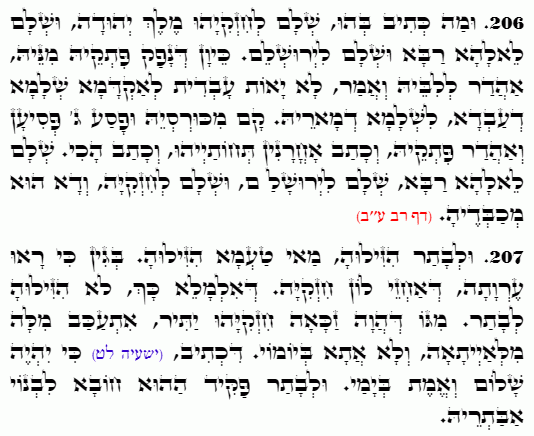Daily Zohar # 4746 – Miketz – Peace to the Great God
Daily Zohar 4746

Hebrew translation:
207. וְאַחַר כָּךְ הִזִּילוּהָ. מָה הַטַּעַם הִזִּילוּהָ? מִשּׁוּם כִּי רָאוּ עֶרְוָתָהּ, שֶׁהֶרְאָה לָהֶם חִזְקִיָּה, שֶׁאִלְמָלֵא כָּךְ לֹא הִזִּילוּהָ אַחַר כָּךְ. מִתּוֹךְ שֶׁחִזְקִיָּהוּ הָיָה יוֹתֵר צַדִּיק, הִתְעַכֵּב הַדָּבָר מִלָּבֹא, וְלֹא בָא בְּיָמָיו, שֶׁכָּתוּב (ישעיה לט) כִּי יִהְיֶה שָׁלוֹם וֶאֱמֶת בְּיָמָי. וְאַחַר כָּךְ פָּקַד אֶת אוֹתוֹ הַחֵטְא עַל בָּנָיו אַחֲרָיו.
.
Zohar Miketz
Continued from previous DZ
#206
And what was written in the letters? “Peace to Hezekiah, king of Judah, peace to the Great God, and peace to Jerusalem.” When the letter left his hand, he reflected and said, “I did not do well to place the peace of the servant before the peace of the Master.” He rose from his throne, took three steps, retrieved his letter, and wrote another one in its place, writing instead: “Peace to the Great God, peace to Jerusalem, and peace to Hezekiah.” And this is the meaning of “כָּל מְכַבְּדֶיהָ” “all her honored ones.”
Notes:
The text emphasizes the importance of prioritizing reverence for Hashem in all actions, as demonstrated by Merodach-baladan’s eventual correction of his letter to honor God before any earthly figure.
#207
And afterward, “הִזִּילוּהָ” “they despised her”—why did they despise her? Because “כִּי רָאוּ עֶרְוָתָהּ” “they saw her nakedness,” meaning that Hezekiah showed them. If not for this, they would not have despised her later. And because Hezekiah was righteous, the matter was delayed greatly. It did not occur in his days, as it is written: “כִּי יִהְיֶה שָׁלוֹם וֶאֱמֶת בְּיָמָי” “For there shall be peace and truth in my days” (Isaiah 39:8). However, the Holy One, Blessed be He, visited that sin upon his descendants after him.
Notes:
The consequences of revealing spiritual or material vulnerabilities are significant. Even if righteousness delays them, they can manifest in future generations, emphasizing the importance of discretion and the lasting effects of one’s actions.
{||}

 Previous: Miketz
Previous: Miketz

